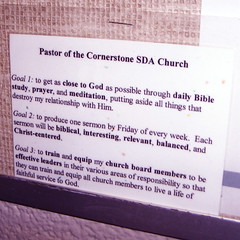Keeping a Time Log - How Depressing
Then, in a second column, I had to categorize my time by roles - "pastoral," "administrative," "visionary," "evangelistic," "secretarial/notmyjob," "janitorial/notmyjob," "rescuing/notmyjob," "games," etc.
I did not like what I found. But they tell me that awareness is the first step to recovery.
I must say that the point of this exercise was NOT to show the utter disaster of my time management skills (although that was a healthy side-effect). My coach was really trying to help me figure out my pastoral role. Was I doing the things I was hired to do, or could these things be done by someone else?
It was really easy for me to rationalize it out from day to day and say, "I'll just do it myself. I want it done right. I don't have time to train anyone, anyway. Who else would do it?" And then I end up mailing out the weekly sermon CDs. For a year! What was I thinking?!!
Do a 1-week time log. You may be surprised at what you find. But awareness is the first step to recovery.
Labels: Accountability, Calling, GTD, Mentor, Processes, Time Management, Tips n Tricks, Values



